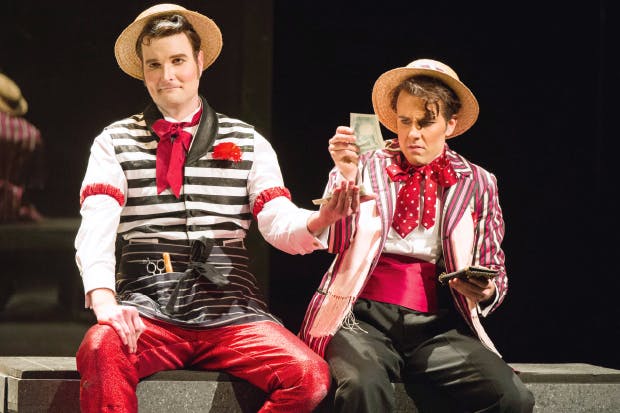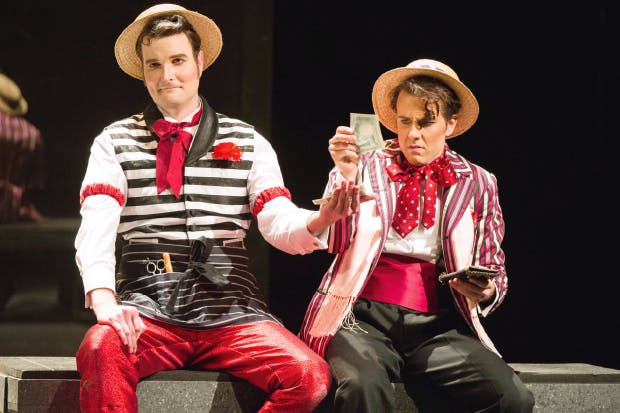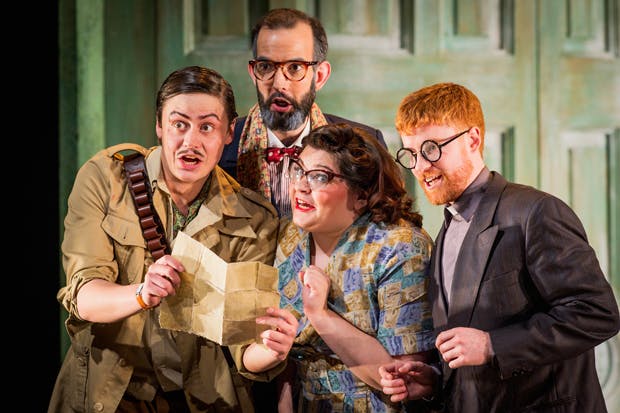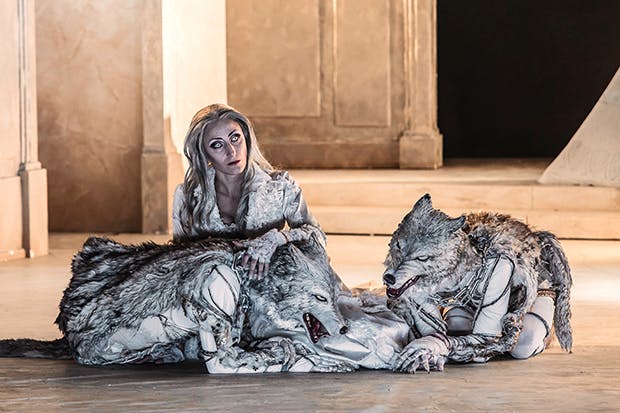‘Forget Downton Abbey!’ exhorts David Pountney in the programme for Figaro Forever, Welsh National Opera’s season of Beaumarchais operas, The Barber of Seville, The Marriage of Figaro and Elena Langer’s Figaro Gets a Divorce. ‘A televisual age in which the vast narrative panorama of a “series” strung out across many episodes seems to capture people’s imaginations is perhaps exactly the right moment to follow the fortunes of the Count and Rosina, their servant Figaro and his fiancée, Susanna,’ he continues.
What WNO’s artistic director means is the opposite of what he says. The reader is in fact being asked to remember Downton and make an improbable connection between the unpredictable business of going out to three live operas, including one world première, and the passive pursuit of watching television at home on the sofa with a cup of cocoa, a plate of biscuits and a smartphone for live-tweeting the worst lines. The forelock-tugging servants that fawn over the frigid, fretful, chinless Crawley family through the first world war, the Spanish flu, women’s suffrage, the rise of fascism and countless pearl-clutching infractions of etiquette have nothing in common with Figaro, the foundling-turned-barber-turned-valet who has the good and bad fortune to be considerably more clever than his aristocratic patron just as the ancien régime begins to crumble. Where Julian Fellowes’s soap opera is besotted with birthright, Beaumarchais’ hero is a self-made man.
Say what you like about the glacial pace of Downton, its multiple anachronisms and dead-eyed delivery, at least it’s pretty to look at. Which Sam Brown’s production of The Barber of Seville, designed by Ralph Koltai with costumes by Sue Blane, isn’t. Brown has seized upon the cruelty and absurdity in Rossini’s 1816 opera and magnified both. Crisply timed to the music of the overture under conductor James Southall, giant scissors snap and snip in formation on stage, held aloft by a male chorus dressed in cat-burglar black. Love — or lust — is here a dangerous entity. An arrow pierces a cartoon heart on the dropcloth, which rises to reveal two walls of Quality Street cellophane. In Koltai’s see-through elevations the streets of Seville are as flimsy as the morals of Nico Darmanin’s daffy, diminutive Count Almaviva, Andrew Shore’s greedy Doctor Bartolo, Rosie Hay’s shrill, sluttish Berta and Claire Booth’s twitchy, flirty, hot-to-trot Rosina, and as changeable as the wit of Nicholas Lester’s Figaro. Forget Downton indeed. Now lit in emerald green, now in scarlet, Brown’s staging owes more to the violent slapstick of the Looney Tunes cartoon Rabbit of Seville and, in the slow-motion brawl of the Act I finale, with the chorus now in drag and beating each other about the head with rolling pins and saucepans, Monty Python’s Flying Circus.
The elegance of the singing is remarkable given the complexity and speed of the movement direction. Accompanied by a glee club dressed in barbershop boaters and striped blazers, Darmanin delivers Almaviva’s serenade while sporting a one-man-band kit with a pedal-operated bass drum. Money talks in this opera, and Almaviva has as much cash as dash, flinging banknotes into the air. Brown plays on the height difference between Darmanin and Lester, the latter so tall that the harpsichord in which he is concealed during Rosina’s Act II singing lesson is as long as a small boat. Powdered like a Victorian doll, he makes his entrance through the auditorium, smoothly handing out business cards as he sings ‘Largo al factotum’ in Kelley Rourke’s breezy, consonant-heavy translation. Richard Wiegold’s dolorous Basilio is blind, with a stuffed toy for a guide dog, while Almaviva’s disguises include a miniature version of Basilio’s get-up with a four-legged friend to scale, and a boy-scout uniform complete with camp-bed.
Booth starts out sultry, flashing her suspenders from the first-floor balcony, then adopts a Manga-esque Bobby soxer costume. While she navigates Rossini’s fioritura with shivery precision and citrus-sharp applications of messa di voce, there’s a lack of warmth to the sound. What has been lost here is tenderness and charm, though Brown carefully highlights Rosina’s desolation when she discovers she has been deceived by Almaviva. Southall keeps the tempi aerobic but WNO’s orchestra fails to recapture the Beethovenian sonority it found under Carlo Rizzi in Pountney’s 2014 production of Guillaume Tell — and Rossini’s comedies need even more seriousness in their phrasing than his tragedies. There’s plenty to divert, to provoke and to amuse in Brown’s Barber. But the only thing that this first episode of Figaro Forever will tell you about the rest of the series is that the Almavivas’ marriage started with a lie.
Got something to add? Join the discussion and comment below.
Get 10 issues for just $10
Subscribe to The Spectator Australia today for the next 10 magazine issues, plus full online access, for just $10.













Comments
Don't miss out
Join the conversation with other Spectator Australia readers. Subscribe to leave a comment.
SUBSCRIBEAlready a subscriber? Log in